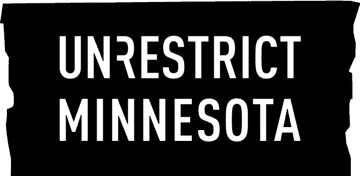As a community-supported public awareness campaign, UnRestrict Minnesota is driven by the solidarity and leadership of its community partners. Together, these advocates, health care providers, lawyers, union members, artists, and concerned citizens are advancing every Minnesotan’s right to access abortion care in our state.
First Unitarian Society of Minneapolis is an intentionally and radically inclusive congregation of adults, youth, and children. As a congregational humanist community, First Unitarian Society of Minneapolis fosters a free search for knowledge and meaning; strives for justice; and builds opportunities for people to serve each other, Minnesota, and beyond.
Q&A
Below, Assistant Minister Rev. Kelli Clement talks about the relationships built within First Unitarian Society of Minneapolis, how the congregation first came to join the coalition that would become UnRestrict Minnesota, and the important role that faith communities can play in advancing full reproductive justice for all.
Could you tell us a little bit about your work?
I am the assistant minister at First Unitarian Society of Minneapolis, and I also serve a small congregation in western Wisconsin, the St. Croix Unitarian Universalist Fellowship. First Unitarian Society is a progressive movement, and a very humanist movement. I think most people there would describe themselves as humanist, and also as either atheist or agnostic. So as a religious organization we are very much bound by values and ethics, and not a credal belief in one supernatural god. For both of our congregations, this means that our community is much more covenantal: interested in this idea that how we behave in the world is more important than what we say we believe.
At First Unitarian Society of Minneapolis, my portfolio includes social justice and congregational care (which some places call pastoral care), encompassing both the ways that we reach outward to make an impact in the world, as well as the ways we care for people and their internal lives. My own particular work has been centered around reproductive health rights and justice for thirty years or so; before moving to First Unitarian Society, I was the executive director of the Minnesota Religious Coalition for Reproductive Choice.
I come to this work because my own abortions were some of the most important actions I was able to take. Because I was able to get excellent professional abortion care when I needed it, I am able to be the parent, the spouse, the daughter, the minister, the friend, the citizen that I am. Because of that agency, I have been able to live a life of purpose. So I say that I am pro-choice because of my faith, and not in spite of it.
Why is this work important to take on?
I think it’s important to take this work on as a faith community because religions have done so much damage to human understanding of sexuality and have created so much shame around reproductive choices. That’s why it feels important to me that we don’t just do the work of reproductive justice in a secular way, but that we do it out of our faith commitments: to right those wrongs in some way, and to ensure that we’re not ceding the public square to the anti-choice crowd. As people of faith, I want us to be out there and to say, “We are connected by a set of values and ethics, and those values and ethics say that everyone should be able to have agency and sovereignty in their bodies.” We are acting on our values and our ethics when we say that the decisions that people make about their bodies are holy and sacred, and they deserve protection and care. Lastly, it’s also important because it’s the right thing to do! We were one of the original plaintiffs in the Doe v. Minnesota lawsuit, and one of the reasons that we joined that lawsuit is because we understand that the decision of when and whether to continue a pregnancy belongs with exactly one person. Because if we don’t have agency, who are we as human beings?
Why did you join the UnRestrict Minnesota coalition?
When I moved to First Unitarian Society, many people were aware that I had spent a lot of time working in reproductive health rights and justice. Someone knew that The Lawyering Project was trying to create something new in Minnesota and they reached out and said, “Kelli, would you and First Unitarian Society be interested in having a conversation?” And I said, “You bet, come on.”
It was that invitation that brought us to join the table of folks who would become UnRestrict Minnesota. And I cannot say enough about how brilliant the organizing has been, from that very first meeting. I think a lot in organizing work about the phrase, “Build it as you mean to go,” and that’s really how this coalition was built. UnRestrict Minnesota created a completely new thing in Minnesota. Rather than one organization deciding on the pathway forward for everyone, UnRestrict said, “We’re going to do a different model of leadership. It’s not going to be top-down. There’s going to be equity around the table, and we’re going to do this together.” It was such a bold move, but more than that, it was joyful and lifegiving. And look! It really did change the landscape in a material way.
It’s also important to say that we hold a unique role in this movement because we don’t provide abortion care and we don’t provide health care. But being a part of this coalition has been a way to use our institutional strength to leverage change, to support those organizations that are doing direct care or direct service, and to take our values and our ethical commitments and set them in motion.
What is your vision for achieving full reproductive justice in Minnesota?
When I think about this vision, I think about the reproductive justice framework: the right to have children, the right to not have children, the right to raise children in safe and healthy environments, the right to bodily autonomy and gender freedom for every human being. So I think the first part of this vision is abortion on demand, without apology and without judgment. And the second part is abundance. So not just adequate something, but abundant everything.
There is no reason, except for political will, that we can’t have abundant everything. But we are caught in a death dealing system, where people are fighting for survival, for the bare minimum. We spend an extraordinary amount of not enough money for all these nonprofits that are trying to create a safety net because the ridiculous amount of wealth in this country is so concentrated at the top. As long as that is true, reproductive justice—which by definition encompasses and engages with all other justice movements—will struggle. For me, my vision of full reproductive justice is a world of abundance. We have so much potential of beauty and brain and imagination and strength; what would it be if we could unleash that? What could we create if people were not struggling all the time for bare equity? What relationships could we build with each other?
So I think full reproductive justice is that everyone gets to do what they want to do with their bodies and their lives and their sexuality. Everyone can access the resources and care that they need. And every person has the agency and freedom to live forward into what covenants they want to make with each other. When justice is made manifest, we can get on with creating the beauty of the world.
How can people get engaged with your work?
The most important thing would be to check us out! Certainly through our website and our social media, and also through visiting us. People can get involved at any level of our work, and we walk with people wherever they are in their journey. Every Sunday morning at 10:30, we have what we call “Assembly.” In that, people hear music, they greet each other, and hopefully they hear an uplifting message about how congregational humanists are making sense of the world and are shifting our own understanding to widen the circle of everybody who’s included. For example, our congregation is predominantly white. Together, we’re working to understand how white supremacy culture has its hooks in us, and learning how we can break that down as an interior thing, and also work in the world to resist and dismantle it.
We have a very active advocacy program and a strong climate justice team, we have a choir, we read and discuss books together, and each Sunday we share a meal. And of course, we also accept donations to our work! But mostly, we’re hopeful that people can visit us and find community–to meet kindred spirits, to join networks of support and care, to have a place to bring their gifts, and to be connected to possibilities.


